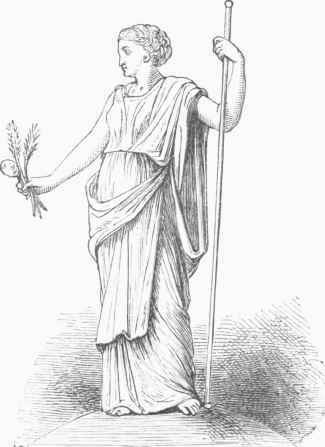Ceres
Description
This section is from "The American Cyclopaedia", by George Ripley And Charles A. Dana. Also available from Amazon: The New American Cyclopędia. 16 volumes complete..
Ceres
Ceres (called by the Greeks Demetcr), the goddess of grain and harvest among the Greeks and Romans, daughter of Saturn and Rhea, and mother of Proserpine. She dwelt on Olympus till after the abduction of her daughter Proserpine by Pluto with the connivance of Jupiter. Ceres in her anger then abandoned the abode of the gods, and descended to earth to wander among men. On all who received her kindly she conferred presents and blessings; but on those who treated her inhospitably, or slighted her gifts, she inflicted severe punishments. In her grief she took neither nectar nor ambrosia, nor attended to her person; and instead of exhibiting her celestial charms, she went in the guise of an old woman. In the course of her wanderings she came at length to Eleusis, where she was hospitably received by its king, Celeus, whose wife Metanira engaged Ceres to nurse her infant son Demophon. Under the care of the goddess the child throve like a celestial. As he lay on her bosom, Ceres breathed on him, and anointed him with ambrosia; and every night, ere she put him to rest, she immersed him in the fire unknown to his parents. Ceres proposed to make the child immortal, but the follv of his mother frustrated her intention.
Metanira, wondering at the marvellous growth of her son, became curious to know how his nurse treated him. Watching one night, therefore, she saw with terror and astonishment the ordeal through which her child was made to pass, and she shrieked aloud at the sight. The goddess instantly dropped the infant, and he perished in the flames; hut to make up for the loss, she bestowed great favors upon Triptolemus, the other son of Celeus. Ceres then cast off her disguise, and appeared in her real character, commanding the people of Eleusis to build her an altar and a temple. A temple was raised in the vicinity, in which the sorrowing Ceres took up her abode. In the mean time the indignation of the divine mother had visited the earth with a famine. Jupiter therefore sent Iris to Eleusis to entreat Ceres to suffer the earth once more to bring forth her fruits, and to endeavor to prevail on her to return to Olympus; but with neither request would she comply, save on condition that her daughter Proserpine should be first restored to her. All the other divinities of Olympus were successively sent to her on the same mission, but in vain.
Jupiter, finding at length that it was impossible to shake her determination, sent Mercury to Erebus to beg of Pluto that he would permit Proserpine to return to the earth on a visit to her mother. The king of Hades at once complied with the request, but while announcing to his consort that she was at liberty to return to her parent, he cunningly handed her a pomegranate seed, which she incautiously swallowed. Proserpine was then conducted by Mercury to Eleusis, and delivered to Ceres. After the first burst of joy at this unexpected meeting had found vent, Ceres asked Proserpine if she had tasted aught in the nether world, to which the latter replied that she had - a single pomegranate seed. Then, said the mother, you must spend one third of every future year in the regions of darkness with your husband, but the other two thirds you will be privileged to pass on earth with me. The wrath of the goddess was now appeased, and she caused the earth to yield fruits in abundance as of old; she instructed the Eleusinian sovereign and his nobles in the mvs-teries of her worship; and when Jupiter sent Rhea to invite her once more to Olympus, she cordially accepted the invitation, and went thither with her daughter to take up her abode again among the immortals. - The chief seats of the worship of Ceres, besides Rome, were Attica, Arcadia, and Sicily, where she was adored under the name of Demeter. The principal sacrifices offered on her altars were swine, the symbols of fertility, oxen, cows, honey, cakes, and fruits.
Her image resembled that of Juno in its maternal character, but expressed more mildness and dignity. She was represented sometimes in a sitting attitude, sometimes walking, and sometimes riding in a chariot drawn by horses or dragons. Her attire was always complete, and on her head she generally wore a garland of corn or a band of ribbon; while in her hand she held a sceptre, a bunch of corn, or a head of poppy, and occasionally a torch or mystic basket. The principal festivals of the goddess were the Thes-mophoria and Eleusinia in Greece, and the Cerealia at Rome.

Ceres.
Continue to:


